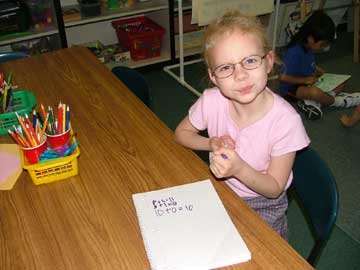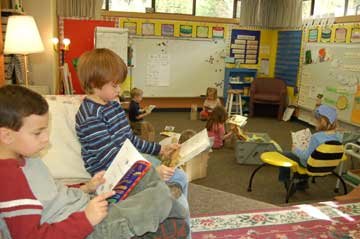This fall, Key Peninsula kindergarten students will stay at school all day. They will ride the same buses as the other elementary students. There will be no midday bus transportation.
 Evergreen Elementary kindergartener Alexandra Emens, from Gail Mitchell’s class, shows off her math work. Photo by Danna Webster
Evergreen Elementary kindergartener Alexandra Emens, from Gail Mitchell’s class, shows off her math work. Photo by Danna Webster
“Next year, there will be all-day kindergarten at all schools with no cost to families,” said Student Services Executive Director Sarah Drinkwater. Research shows that all-day kindergarten “benefits all types of learning: math, reading, social skills and independent care habits,” she said.
According to PHS Superintendent Terry Bouck, the idea to move forward with all-day kindergarten was initiated by then-Superintendent Jim Coolican. The new state mandate is that all 1,267 schools will have full-day kindergarten classes by the year 2013, and the state will gradually fund all-day K programs statewide starting next year, based on poverty levels. It would be a few years before PSD would receive any of that new funding.
Many school districts in the state have started considering the move before it became a legislative mandate, and Peninsula School District has been a pioneer in this new thinking, which educators say is supported by extensive research.
PSD has been preparing for the all-day K program for the past two years. This year, about half of all elementary schools offered all-day kindergarten; however, the second portion of the day was optional for parents and was tuition-based.
With reports of a district deficit of $4 million, how can it afford to put a new program in place? “The $4 million deficit is a spend-down reserve,” Bouck said, pointing to the declining enrollment as the principal factor that led to the district using reserve monies to cover some costs.
According to Bouck, the money for the kindergarten program is not from basic education funds; it is all new money from Initiative 728 funding. About 60 percent of those funds are used for reduction in class size, and about 40 percent will go toward funding all-day kindergarten.
“The number one is not to impact class size in the district,” Bouck said. “Anything else, but we must not impact that.”
 Minter Creek kindergartners during reading time in Anita Huysman's all-day class. Photo by Mindi La Rose
Minter Creek kindergartners during reading time in Anita Huysman's all-day class. Photo by Mindi La Rose
The current class size is 18-22 students. But a few years ago, there was an experiment with a class size of 18 or less, according to Andrea Jewell, a recently retired kindergarten teacher from Vaughn Elementary School. It is her opinion that lowering class size benefits kindergarten students more than a full-day program. She has written her opinion in newspaper editorials.
“A few years ago we had a one year experiment with smaller class sizes of 18 or less. This gave a more relaxed feeling to the day and allowed the teachers to individualize the instruction. They didn’t have to deal with behaviors caused by exhaustion and stress. It was found that the children progressed much farther than in more crowded classrooms,” she wrote. “I am a retired kindergarten teacher who shares the concerns of parents about the all-day kindergarten being too much for many children. Seven to eight hours a day, including transportation, has been too stressful for many in the all-day kindergarten at Vaughn.”
Bouck said the schools can be flexible and accommodate their schedules for parents who are concerned that a full day is too long. Children can attend kindergarten as a half-day student, if the parents can provide the midday transportation.
“Our concern is about the student,” Bouck said. “(The program) has got to be what is in the best interest of each child.”
Evergreen Elementary Principal Jacque Crisman has had all-day kindergarten at her building for three years. When Evergreen started the full-day program, she was worried that “it was pushing too much. It’s not,” she said. “Kids are so much more capable than we give them credit for. They are like sponges. At the beginning of the school year, fatigue is hard for everybody. The first year, we thought we would provide naps. But the kids just go, go, go all day long: paint, play house, work on computers, read, sing songs, play blocks and have full lessons in math, reading, writing and science. Three days a week they have PE and two days they have music.” There is a half-day option at Evergreen but no families have taken it. “Look at what they might miss,” Crisman said.
Earlier in her career, Crisman taught kindergarten. She had two classes per day and in the two and a half hours of each class she tried to do all that a full-day program would provide. Those were stressful years and she was eager to leave kindergarten. She said the stress of not having the time to do all things she wanted to do for each class made that teaching assignment the worst in her career, which has ranged from primary grades to university level.
Full-day kindergarten makes an important difference, according to Crisman. It is all about time. “The time the children are given is so powerful,” she said. “Time to process, time to finish projects, time to get things done. Fewer kids are struggling to get done.”
Evergreen’s first all-day kindergartners are second graders this year. They will take the WASL next year. Crisman hopes their all-day K education will show a positive influence on test scores. She believes the all-day kindergarten is good addition to the Evergreen school and credits her staff for making a great learning environment for all the students.
UNDERWRITTEN BY THE FUND FOR NONPROFIT NEWS (NEWSMATCH) AT THE MIAMI FOUNDATION, THE ANGEL GUILD, ADVERTISERS, DONORS AND PEOPLE WHO SUPPORT INDEPENDENT, NONPROFIT LOCAL NEWS